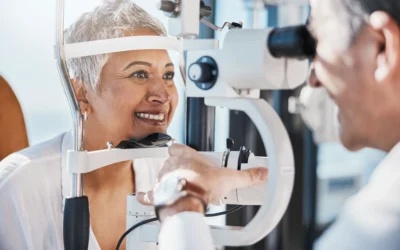When you visit your eye doctor, you expect them to check for vision problems or signs of eye disease. However, did you know that an eye exam can also reveal important information about your overall health?
One condition that your eye doctor may be able to detect is high blood pressure, a common but dangerous condition that affects millions of people in the U.S. In this blog post, we’ll explore how eye exams can detect high blood pressure early on, why this is important, and what you can do to maintain the health of your eyes and overall body.
How does high blood pressure affect your eyes?
During an eye exam, your eye doctor will examine your eyes’ blood vessels, retina, and optic nerve. These are ideal places to check for signs of high blood pressure because the blood vessels in the eye are sensitive to changes in the body’s blood pressure.
High blood pressure can cause the walls of your blood vessels to thicken and narrow over time, which can lead to serious health issues such as heart disease, stroke, and kidney disease. Our eye doctor can detect high blood pressure early on by examining the blood vessels in your retina, which is the only place in the body where blood vessels are visible. This means we can start treatment earlier and prevent serious complications.
Why is early detection of high blood pressure important?
High blood pressure doesn’t always have symptoms, which is why it’s often referred to as “the silent killer.” Regular eye exams are crucial because your eye doctor can detect high blood pressure before you notice any symptoms. Catching it early and treating it can help prevent permanent damage to different parts of your body, including your eyes.
In some cases, high blood pressure can put pressure on the optic nerve. This pressure can lead to eye issues like glaucoma, a serious eye condition that can cause blindness. Detecting high blood pressure early allows your eye doctor to monitor your eye pressure and take steps to prevent glaucoma.
Managing your high blood pressure
To manage your high blood pressure, start by making a few lifestyle changes such as eating a healthy diet, exercising regularly, reducing your stress levels, and quitting smoking. Additionally, your doctor may recommend medication to lower your blood pressure levels. Hypertension is a chronic condition, so it’s essential to get regular check-ups and monitor your blood pressure levels regularly.
Other health conditions detected during an eye exam
In addition to high blood pressure, an eye exam can also detect other medical issues such as diabetes, multiple sclerosis, and even certain types of cancer. This is because the eyes are connected to the rest of the body through the nervous system, and certain diseases or conditions can affect the eyes in specific ways.
In conclusion, eye exams are more than just a way to check your vision. They can also help detect a variety of health issues, including high blood pressure. By getting your eyes checked regularly, you can not only ensure good eye health but also overall health. So, if you haven’t had an eye exam in a while, schedule one with us at Vision Center LTD in Shelton or Waterbury Eye Associates in Waterbury today!



